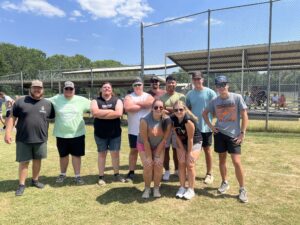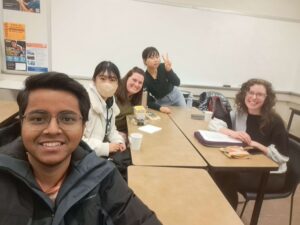For our recent National Collegiate Ministers Summit in Hendersonville, TN, I was asked to lead a breakout on “Ten Books Every Collegiate Minister Should Read.” As an avid reader and a “resource curator,” I eagerly took to the assignment. When I realized there was no way I was going to be able to bring my list down to ten, I decided on a different approach: I grouped my suggested books into key categories in which I felt a collegiate minister who wanted to be informed and equipped needed to be reading.
So, before I share my list, a few intro remarks and caveats:
- We all need to read. If you want to grow, you’ll be a reader. The person who does not read has no advantage over the person who cannot.
- One way of looking at reading is that it allows us to be mentored by many people across distance and the ages. Reading allows many others to speak into our lives.
- Our addiction to technology and screens has impacted our reading habits. Philip Yancey, the prolific Christian author, wrote recently that even he was finding himself distracted and struggling to read long passages and books these days due to his online/phone lifestyle. If Philip Yancey is struggling, we’re all in trouble. We need to read deeply and broadly. Put down the phone.
- Some of the books I list may, at times, reference things outside your comfort zone or things you may not agree with. That’s okay. I don’t agree with everything I read. We don’t have to agree with everything someone says or writes in order to learn or benefit from other things they say or write. You can filter as you read deeply and broadly.
- My list intentionally does not include books that focus directly on collegiate ministry. There are many great collegiate ministry books out there, and you can find such book lists on the Collegiate Collective website and other places. I didn’t focus on these for two reasons: First, most everyone is already familiar with these books. (I did not include the category “Discipleship” for the same reason; so many already travel this territory.) And second, my approach was to pull back a bit from the “how to” books that deal with our ministry at the ground level or just above that. We need to read at the practical ground level but also at the 5K, 10K, and 20K levels. I love books that serve to inform and equip us for the kinds of ministry opportunities and challenges we face and those which speak to the larger context in which we serve. My categories reflect that. Think of your one-on-one encounter with a student as the tip of the spear of your ministry. You listen and speak with that student about whatever the focus is on. Much better, if you are able to bring to that encounter a depth and breadth of wisdom that you can call on as needed.
- And finally, I offer this quote from Trevor Hudson of the Renovaré Institute: “I’ve never forgotten the day I asked, with pen and paper in hand, for Dallas Willard to give me a list of books to read. His answer: ‘Matthew, Mark, Luke, and John.’” Of course. The Bible is foundational. These books do not replace a steady diet on God’s Word. Let’s just say that up front.
And so, here’s my list. They’re all great, but for this post, I’m going to highlight one book from each category and list other great reads. I don’t have the space to review all of them, but if you want more detail, email me at [email protected] for the full review.
MISSION
The Forgotten Ways (Alan Hirsch)
Of all the great books on “The Missional Church,” this is one of the best. From the description: “Alan Hirsch’s paradigm-shifting classic remains the definitive statement of the church as dynamic missional movement.” YES! You will never see the church and its mission the same way again. Not a difficult read, but definitely a lot to chew on. You will want to give this one time. And, be sure to get the revised, 2016 version. It’s almost like a new version from the original.
Other great reads:
- Foolishness to the Greeks; The Open Secret (Leslie Newbigin)
- Right Here’ Right Now (Alan Hirsch)
- Surprise the World (Michael Frost)
- To Change the World (James Davidson Hunter)
- When Helping Hurts (Corbett and Fikkert)
- Friendship at the Margins (Christine Pohl)
CULTURE
(I’m cheating and listing two.)
Onward (Russell Moore); Confident Pluralism (John Inazu)
By all accounts, we are now in the midst of a major shift to a post-Christian culture. How we as the People of God respond to and navigate this new world is a major point of discussion, often fraught with more heat than light. Moore does not hide the truth about our challenges but prophetically shows how we can be faithful in such times. (Onward was named Christianity Today’s 2016 Book of the Year.) Likewise, Inazu covers the same territory but is a legal scholar and offers insight into how we live in a world where we do not always get to call the shots. When the Obergfell v. Hodges decision on same-sex marriage came out in 2015, I used a number of articles by Inazu during our Campus Ministers’ Retreat that summer to help guide our discussion. He’s an extremely wise and helpful voice for our times.
Other great reads:
- A Primer on Postmodernism (Stanley Grenz)
- Understanding Postmodernism (Kelly and Dew)
- Truth is Stranger Than It Used to Be (Walsh and Middleton)
- Caring for Words in a Culture of Lies (Marilyn McEntyre)
- Is Reality Secular? (Mary Poplin)
- A Practical Guide to Culture (John Stonestreet)
EVANGELISM
Gospel Fluency (Jeff Vanderstelt)
I was introduced to the concept of one being fluent in the gospel a few years back by one of my good pastor friends in New Jersey. Being conversant in a language can get you in the door, but being fluent gets you full buy-in. Likewise, being fluent in the gospel means we haven’t just memorized an outline or bullet points, but it flows naturally out of our DNA. Jeff Vanderstelt has been a pioneer and pacesetter in teaching how believers can be so fluent in the gospel that we can readily share and apply it to any situation. What a great idea this would be to share with your students!
Other great reads:
- The Explicit Gospel (Matt Chandler)
- I Once Was Lost: What Postmodern Skeptics Taught Us About Their Path to Jesus (Everts and Schaupp)
- Our Deepest Desires: How the Christian Story Fulfills Human Aspirations (Gregory E. Ganssle)
- The Master Plan of Evangelism (Robert Coleman)
- Evangelism Outside the Box; Reimagining Evangelism (Rick Richardson)
- Out of the Salt Shaker & Into the World (Rebecca Manley Pippert)-still great after all these years!
UNDERSTANDING YOUNG ADULTS
The New Copernicans (David John Seel, Jr.)
I’m going to admit right up front that although I have this book and it’s in my personal queue, I’ve yet to read it. But, this recent release comes highly recommended by people I trust and respect as being one of the best books in helping understand the generation coming of age in our post-Christian environment. Seel takes a positive view of this generation, seeing them as both “the church’s greatest challenge and its most exciting new opportunity.” Based on the high recommendations by those who have read it, I’m encouraging you to join me and do the same.
Other great reads:
- Almost Christian (Kenda Creasy Dean)
- Marching Off the Map (Tim Elmore)
- The Vanishing American Adult (Ben Sasse)
- The Defining Decade (Meg Jay)
- Meet Generation Z; The Rise of the Nones (James Emery White)
HIGHER ED/LIFE OF THE MIND
Virtuous Minds (Philip Dow)
This on is The Templeton Foundation Character Project’s Character Essay and Book Prize Competition award winner (That’s a mouthful!). We live in a technological world that has greater access than ever to new information and yet no idea what to do with it. Philip Dow makes the case here for the recovery of intellectual character, and, in doing so, explores seven key virtues: courage, carefulness, tenacity, fair-mindedness, curiosity, honesty, and humility. The formation of intellectual character produces a way of life that demonstrates love for both God and neighbor. A worthy read.
Other great reads:
- Why College Matters to God (Rick Ostrander)
- Christ Across the Disciplines: Past, Present, Future (Roger Lundin)
- Engaging God’s World: A Christian Vision of Faith, Learning, and Living (Cornelius Plantinga, Jr.)
- Discipleship of the Mind (James W. Sire)
- Think: The Life of the Mind and the Love of God (John Piper)
- Learning for the Love of God (Opiz and Melleby)
WORK/VOCATION
Visions of Vocation (Steve Garber)
This book won just about every award that could be given when it came out in 2014. Steve Garber’s life’s calling has been to come alongside people from all walks of life and help them make sense of their world and how their vocation can matter to the world. From reviews I read: “Part prophet, part pastor, and part teacher, Garber reminds the reader that to be alive on this earth is to be called―to be implicated in the common good of your time and place. Now that you know what you know, what will you do? he asks.” “Many Christians struggle with envisioning what it is to be and to work in the world. Garber offers stories and wisdom that affirm the goodness and rightness of Christians pursuing callings in areas not traditionally considered ministry but that may be missional nonetheless.”
I’ve been reading through this book over the past few weeks and have found it a profoundly beautiful reflection on helping us to find a larger congruence between our world and our place in it. I highly recommend this book.
Other great reads:
- The Fabric of Faithfulness: Weaving Together Belief and Behavior (Also by Steve Garber)
- Every Good Endeavor: Connecting Your Work to God’s Work (Timothy Keller)
- The Call (Oz Guiness) A classic!
- Work Matters (Tom Nelson)
- Culture Making (Andy Crouch)
- Serious Dreams (Byron Borger)
SPIRITUALITY
A Praying Life: Connecting with God in a Distracting World (Paul E. Miller)
I initially got this book last year because I read that J.D. Greear had his entire staff at The Summit Church read it together. I respect J.D., so I gave it a try. My first thoughts upon reading it were, “How did this guy get into my head?” Miller addresses head on the distractions and challenges we have today in trying to practice the habit of real prayer, and all my excuses and complaints and challenges were in there.
From my friend Byron Borger of Hearts & Minds Bookstore: “This one may be the most talked about book in this field in decades, in part because it combines a deep, orthodox Biblical perspective with a profound sense of the goodness of God’s great mercy shown in Christ’s grace, but also because the author is himself a learner, sharing stories and anecdotes from his own struggle to deepen his relationship with God through prayer. In this very engaging work, Miller offers wise, but down-to-Earth advice, and tells humorous stories about his own daily life.”
I’ve referenced this book with a number of people, and every person who’s read it says it’s one of the best books on prayer they’ve ever read. That alone should be enough to get you to give it a try.
Other great reads:
- Liturgy of the Ordinary: Sacred Practices in Everyday Life (Tish Harrison Warren) I lovethis book!
- You Are What You Love: The Spiritual Power of Habit (James K.A. Smith)
- The Shattered Lantern: Recovering a Felt Presence of God (Ronald Rolheiser)
- Streams of Living Water (Richard Foster)
- Sacred Rhythms: Arranging Our Lives for Spiritual Transformation (Ruth Haley Barton)
RACE AND INEQUALITY
White Awake: An Honest Look at What It Means to be White (Daniel Hill)
We all need to be listening, reading, and learning regarding the dynamics and moral and economic implications of race and culture in our nation, and especially those of us from the historically dominant white culture. Other books listed here include authors of color, which we need to read and listen to, but as most reading this will be white, I’m going to run with this recent book by Daniel Hill, a white guy who chronicles his personal journey from a kind of well-meaning cluelessness to a more robust and full understanding of the implications of his whiteness. As such, his story can resonate and be a guide for us as walk our own such journeys.
Other great reads:
- The Myth of Equality: Uncovering the Roots of Injustice and Privilege (Ken Wytsma)
- Tears We Cannot Stop: A Sermon to White America (Michael Eric Dyson)
- Beyond Colorblind: Redeeming Our Ethnic Journey (Sarah Shin)
White friends: We need to read here. Really. Please.
IMPACT OF TECHNOLOGY
Part of discipleship is helping our students know what it means to be counter-cultural when necessary. Today, this has to include being aware of the influence/impact of the Internet and an almost constant online presence.
I’m going to cheat once again. I really can’t pick just one out of this list. They are all getting at the impact our hyper-connected digital world is having on our souls, as well as our physical minds and bodies. I’m not trying to be a Luddite here; I fully inhabit this world, as I’m sure you do, or you would not be reading this blog. I’m just saying that if we are to be wise guides for our students, we need to be fully aware not only of the promises and benefits, but also the challenges of this world. Over the past 15 years, my question has been, “Even for those students who love Jesus and want to walk with him, how can a multitasking, constantly distracted and interrupted lifestyle not affect their prayer lives?” My question today is, “How does it not affect all our prayer lives?”
Great reads:
- The Shallows: What the Internet is Doing to Our Brains (Nicholas Carr)
- The Wired Soul: Finding Spiritual Balance in a Hyperconnected Age (Tricia McCary Rhodes)
- Amusing Ourselves to Death (Neil Postman) A classic from 1985 and still highly relevant.
- iGods: How Technology Shapes Our Spiritual and Social Lives (Craig Detweiler)
- The Tech-Wise Family: Everyday Steps for Putting Technology in its Proper Place (Andy Crouch)
- The Revenge of Analog: Real Things and Why They Matter (David Sax)
- The Pleasures of Reading in an Age of Distraction (Alan Jacobs)
- Living Into Focus: Choosing What Matters in an Age of Distraction (Arthur Boers)
COUNSELING/MINISTRY
(For this category, I’m throwing in several works that focus more on the pastoral side of our roles as collegiate ministers.)
Generation to Generation: Family Process in Church and Synagogue (Edwin H. Friedman)
It’s possible, if you went to seminary, that this was one of your assigned texts. It was one of my assigned texts in my D.Min. studies at Golden Gate Seminary. It’s considered a classic text in the field of pastoral studies. And yep, this was written by a Rabbi.
The great contribution of this book is that it helps us see each person to whom we minister not simply as an individual, but as a component of a system of family, church, community, culture, and so on. Before being exposed to this book, if I was meeting with or discipling a student, I tended to look at the student before me as a mostly self-contained unit. After reading this, I knew I could never look upon a student that way again. Today, I will always ask a student to tell me about his/her family, where she grew up, about his community, and so on. Discipleship isn’t a one-size-fits-all process. The dynamics of family and personal history must be taken into account. Friedman helped me realize this.
Other great reads:
- A Long Obedience in the Same Direction (Eugene Peterson)
- The Wounded Healer (Henri Nouwen)
- The Search to Belong (Joseph Myers)
- Living in Community (Christine Pohl)
- Why You Do What You Do (Tim Clinton)
PERSONAL PRODUCTIVITY
What’s Best Next: How the Gospel Transforms the Way You Get Things Done (Matt Perman)
There are lots of great productivity books out there, but many will appreciate reading one written by a committed Christian. Perman builds upon popular productivity principles and presents them in a gospel-centered framework and addresses not just the “how to” but also the “why” of our productivity. In presenting his gospel-centered view of productivity, Perman addresses 12 myths of productivity and restates them from a truth perspective. For example, one myth says, “The way to be productive is to have the right techniques and tools.” Perman’s reframing says, “Productivity comes first from character, not techniques. The only way to make the right decisions is first to be the right kind of person.” I’m sure many from our collegiate ministry tribe will find such a resource very valuable.
Other great reads:
- Getting Things Done: The Art of Stress-Free Productivity (David Allen)
- StrengthsFinder 2.0 (Tom Rath)
- Margin (Michael Swinson)
- The Rest of God (Mark Buchanan)
- The Radical Pursuit of Rest: Escaping the Productivity Trap (John Koessler)
- Subversive Sabbath (A.J. Swoboda)
LEADERSHIP
Canoeing the Mountains (Tod Bolsinger)
My friend Byron Bolger is very high on this book. The title comes from the fact that although the explorers Lewis and Clark were in search of a waterway passage that would lead to the Pacific, they found themselves instead having to cross the Rocky Mountains. If you’ve ever read their story, you know that they had to solve numerous problems in real time and thousands of miles from civilization, and thus had to develop not just creative solutions but a new way of leadership. Bolsinger draws inspiration from their story and from his many years of leading churches and other organizations through unchartered territory to help readers reimagine what leadership looks like in a rapidly-changing world. This is a superb work on adaptive leadership.
Other great reads:
- In the Name of Jesus (Henri Nouwen)
- The UnLeader (Lance Ford)
I would love to read your thoughts about any of these books or others you feel are helpful for our work.
Robert Turner is the Emerging Regions Collegiate Consultant and Collegiate Team Leader in Pennsylvania/South Jersey.







 by
by